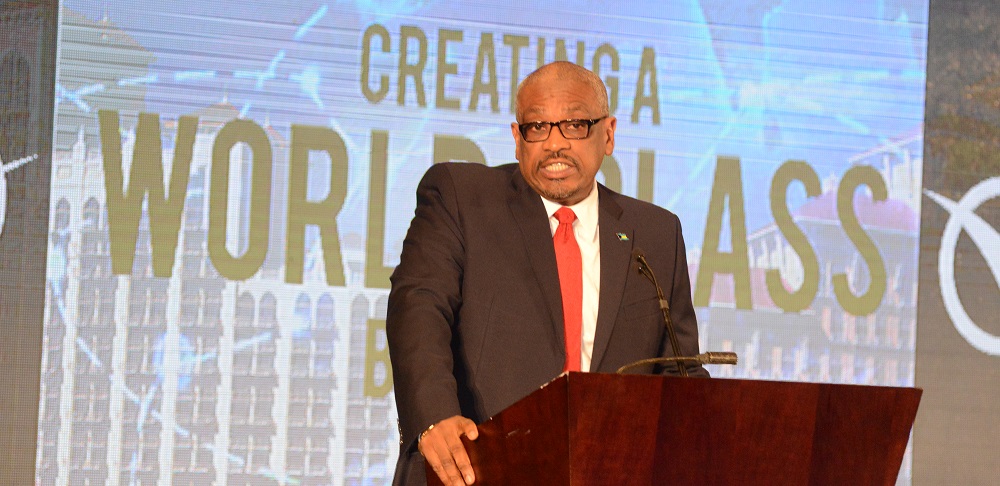#Bahamas, January 19, 2018 – Nassau – The Bahamian economy is steadily improving as a result of the Minnis Administration’s dramatic reform agenda during the first seven months of its governance of The Bahamas, and while there is still “a long road ahead,” there are positive prospects for the economy on the horizon, Prime Minister, Dr. the Hon Hubert A. Minnis said Thursday. Prime Minister Minnis said the turnaround is also a result of the “certainty and stability” his Administration has brought to the table insofar as government policy (policies) is concerned.
“Certainty and stability are crucial for economic growth and development,” Prime Minister Minnis told a packed room. “Even in tough economic conditions, businesses invest and create jobs if there is certainty about government policies on things like work permits, taxes, regulations relating to their business and other matters.”
Addressing the Opening Session of the 27th Annual Bahamas Business Outlook Seminar under the theme “Creating a World Class Bahamas,” Prime Minister Minnis said his Administration undertook a number of initiatives of dramatic reform and transformation in order to stabilize the Bahamian economy when it first took over the reins of governance on May 10, 2017.
Prime Minister Minnis said his Administration was also able to forestall further downgrade of the country’s credit rating through “quick action and careful financial management” a process, the Prime Minister said, took tremendous effort and “reining-in” of public finances.

“Upon coming to office, my Government fully appreciated that becoming a world class country demanded dramatic and ongoing reform, modernization and transformation.
“To aggressively pursue our reform agenda required a programme of immediate stabilization; ideas for economic liberalization and public sector reform, and a variety of initiatives to boost growth and development.
“We had to first stabilize public finances and the economy through fiscal discipline, transparency and honesty with international agencies. Through quick action and careful financial management, we forestalled further downgrade of our credit rating. This took tremendous effort and reining-in of public finances.”
Prime Minister Minnis said his Administration continues to address the issue of corruption by public officials – which he said is a burden on the public sector and which retards investment, development and productivity. Additionally, the Government “continues to take the necessary steps” to comply with various international norms and protect the country’s financial services industry.
“Upon our election to office, The Bahamas faced the threat of immediate blacklisting by the Organization of Economic Cooperation and Development and the European Union. We faced blacklisting if we failed to give a definitive indication of our commitment to apply for membership to the Multilateral Convention for the Automatic Exchange of Tax Information.
“We are continuing to take the necessary steps to comply with various international norms and to protect our financial services industry. The Government is also committed to a programme of dramatic reform and liberalization of the economy.”

The further liberalization of the economy will include a focus on Bahamian small and medium-sized businesses (SMEs) which the Prime Minister said are “a critical part of our economy.”
“These businesses employ thousands of Bahamians. They are critical for economic growth,” Prime Minister Minnis said.
The Prime Minister outlined a litany of initiatives his Administration has undertaken or will undertake in the near future that are designed to “move the Bahamian economy forward” even further. These include the recent liberalization of the Exchange Control Regime, the introduction and passage of the Commercial Enterprise Bill (now Act), the impending sale of the Grand Lucayan and Memories properties in Grand Bahama, and the establishment of Deliverables Unit in the Office of the Prime Minister, among other initiatives.
The Prime Minister also announced his plans to undertake a number of investment promotional trips to Canada, the United States, Europe, East Asia and South American.
By: Matt Maura (BIS)
Photo Caption: Prime Minister, Dr. the Hon. Hubert Minnis.
(BIS Photo/Peter Ramsay)


 News5 days ago
News5 days ago
 Caribbean News6 days ago
Caribbean News6 days ago
 News5 days ago
News5 days ago













